Erstellt am: 18. 6. 2012 - 18:15 Uhr
Racism and Poland
As I arrived in Krakow, police were pouring over footage of a Dutch open training session in the city in which a section of fans were alleged to have racially abused the Oranje players. It was an incident that has cast a shadow over Poland`s hosting of the show-case event and seemed to confirm widely-publicized pre-tournament fears. Is Poland a hot bed of unreformed racists and xenophobes? It`s a reputation the country is struggling to shake off. But is it fair?
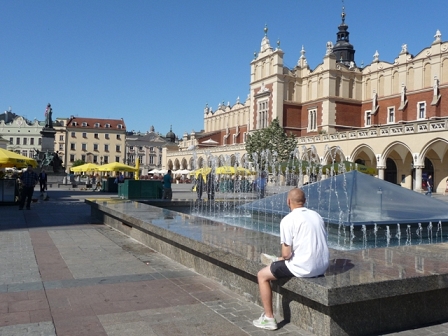
chris cummins
“It`s definitely a shame for Poland and it`s harmful for all of Polish society,” complains anti-racism activist Iga Machalewska, who meets me on Krakow`s spectacular and sun-blasted main square. “We should not be represented by a group of violent and racist football fans,” she insists, “That`s not how we see ourselves.”
But Krakow has a PR problem that is literally written on the city`s walls. In this most beautiful of cities there is an ugly phenomenon that shocks foreign visitors to the city - anti-Semitic graffiti. Iga takes me to a side street in the city`s Kasimierz district where “Anti Jews” has been scrawled on a wall. There needs to be some context here. The taunts, explains Iga, relate the perceived Jewishness of one of Krakow`s three football teams, Cracovia the supporters of which describe themselves as “Judenbande” in an adjacent piece of graffiti. They call the Wisla Krakow fans “dogs”. Many people see the street-writing as a part of football rivalry, says Iga: “Most people seeing the graffiti, will just see two football teams, they don’t even think of it as anti-Semitic. What we are struggling against here of indifference and lack of awareness.”
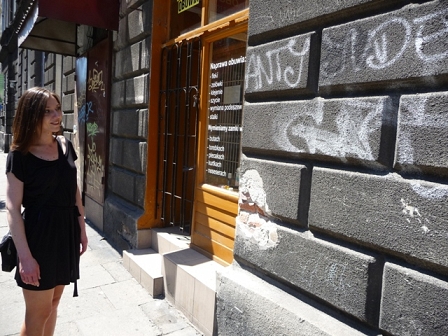
chris cummins
But this indifference is appalling given the historical background. Kasimierz was once a thriving centre of Jewish culture before the community was decimated by the Holocaust. Much of Kasimierz`s population perished in the nearby Auschwitz death camp. And yet people walk past the graffiti as if it is normal part of the cityscape. What`s more scary? The minority who write the words or the majority that accept them? “We want to make people aware that you can’t look away, when this is happening,” says Iga.
To evoke the word Jew as a term of contempt just a few kilometres from the scene of humanity`s greatest crime is beyond insensitive. Many Jewish tourists come to Kasimierz to retrace their family history. How must they feel if they see anti-Jewish slogans on the walls? I am not being sanctimonious here - this is not “football banter”.
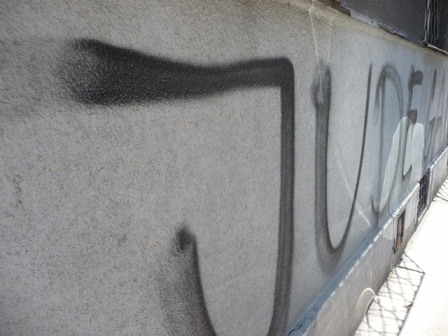
chris cummins
To combat this “passive acceptance”, Iga formed a group called Interkulturalni 18 months ago which encourages Krakow`s citizens to photographs such graffiti and post them on a section of `s homepage called Walls of Shame. “If you notice this sort of graffiti and take some action then you are actively taking part in a fight against racism and xenophobia.”
The issue was taken up by BBC journalist Chris Rogers who BBC documentary entitled “Stadiums of Hate” which has done much to form perceptions of her country in the run up to the tournament. “For some football fans,” Rogers says in the documentary, which also including Polish fans taunting a black player with monkey gestures, “the word Jew means someone to be defeated or even killed.” The documentary showed the widespread use of white power symbols. Duly shocked, former England defender Sol Campbell reacted to the film by warning his no-white countrymen to avoid the host countries or risk “coming home in a coffin.”
The documentary was shown in Poland and everyone is talking about it. Yet even Iga, who has made it her mission to make sure racism isn’t swept under the carpet, is very disappointed by the is “selective” and only shows a “little fragment of reality”. Campbell’s warning to England fans made headlines, but the fact remains that no racist attacks against British people have been reported to the British embassy in Warsaw for at least three years.
In Krakow I bumped into Nick Hodge, a reporter from Radio Poland, who has lived in the country for ten years agrees that the media coverage of racism in Poland had not always been balanced in the run up to the tournament. “As so often in the media, things get sensationalized because they make a better story.”
Jonathan Ornstein was even more disappointed. The executive director of the Jewish Community Center in Kraków was used as a witness to anti-Semitism in Poland, but when he saw the film her felt he comments had been taken out of context and disingenuously edited. Incensed he wrote a letter to the Economist news magazine.
“The interview lasted approximately one hour during which I emphasized that the small number of football fans in Poland engaging in anti-Semitic and racist behavior do not represent Polish society as a whole” he wrote, adding that Poland, “while certainly not devoid of problems with tolerance, has made great strides in that area and in my opinion has been unfairly portrayed by the BBC.” Poland has, for example, two black MPs. He complained that when he suggested some positive angles, such as interviewing two Israeli footballers playing for Wisla Krakow he was told that angle “didn’t fit their story.
The BBC denies any unbalanced reporting, and certainly Chris Rogers didn’t stage the footage of fans shouting “Death, death to the Jewish whore.” It has robustly defended the reporting which it says “was both legitimate and fair” and said its reporters would have “jumped at the chance” of interviewing the Israeli players. Far from describing the whole country as racist, the documentary explicably states that Polish football culture had not kept pace with the positive developments in society as a whole. The BBC says, by distancing himself from the comments he made “handed those racist and anti-Semitic followers of football in Poland a big excuse not to mend their ways.”
So the BBC sees its report as a challenge. Perhaps the obvious embarrassment the footage has caused Poland will be a trigger for the issue to be dealt with seriously. Indeed, although Iga from Interkulturalni considers the coverage to have been unfair, she says that there has been some positive fall-out from the Stadiums of Hate documentary – officially urgency in the fight to stamp out racial hate speech. It would be wrong to suggest that the authorities had previously ignored the problem. Annually, they spend around zloty 150,000 or around 35,000 euros, scrubbing Krakow's walls clean of the racist or anti-Semitic graffiti but it seems the BBC film did spur local government into action. “They are very sensitive to criticism from outside” says Iga, who notes that in the past weeks they have been very open to Interkulturalni`s ideas.
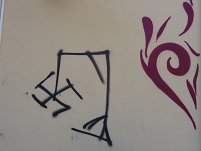
chris cummins
But she is worried that if Polish people feel they are being vilified unfairly they are likely to go into denial and it will be hard than ever to confront and discuss prejudice openly. Iga would rather like to focus on positive examples of civil courage. She told me that at a public viewing she overheard someone making a racist comment against the Czech Republic`s Theodor Gebre Selassie but the racist was shouted down by others.
Interkulturalni have been looking at ways to make it easier assimilate into life in Krakow, investigating, for example, how well Krakow's institutions meet foreigners their needs. They hold anti-discrimination training with the local police. Poland remains a very homogeneous society and you simply don’t see many non-white faces on the streets of Krakow. But Iga says that society is more diverse than you might think and she would like to see different ethnic groups playing a more active role in cultural life in the city.
Dieses Element ist nicht mehr verfügbar
Iga`s colleague Adam Bulandra, who joins us for a drink in a street side café in Kasmierz, says Interkulturalni is trying to celebrate and promote foreign cultures in Krakow. They recently organized an African music night and an Asian festival is planned for the autumn. Adam is pleased with the co-operation of the city authorities which he says has improved immeasurably over the past decade.
“We need to make Polish people more open and more tolerant. We actually need to make them see that foreigners are living among us and that they are part of our community.”
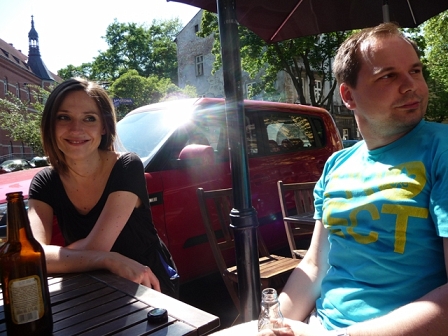
chris cummins
Adam and Iga see the hosting of Euro 2012 as an opportunity for Poland. With so many people from so many countries coming to the country Adam describes it as a chance to embrace openness. And to an extent they are pleased that the tournament has led to the issues of xenophobia and racism being discussed nationally and at a high level. “I think it is a chance to have some big changes,” he says.
If the negative reports, such as Stadiums of Hate, really scared fans away Iga feels that is a shame. It`s a lost opportunity for Poles to meet and celebrate with as many diverse fans as possible, and a lost chance for people to leave their pre-conceived ideas at home, to come to Poland and get to know the country as it really is. It`s a country of courtesy and smiles and a lot of pride. No wonder it hurts to be represented by Neanderthal hooligans.
Poles are still nursing the hangover of a shock early exit - now is their chance to show all their adundant charm as hosts and enjoy an inclusive party to confound their critics.
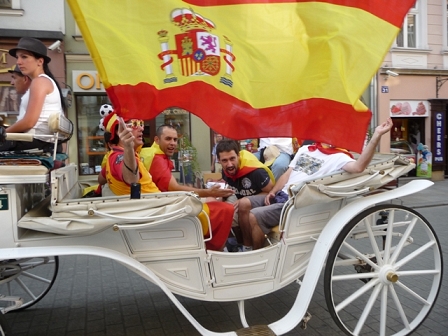
chris cummins


